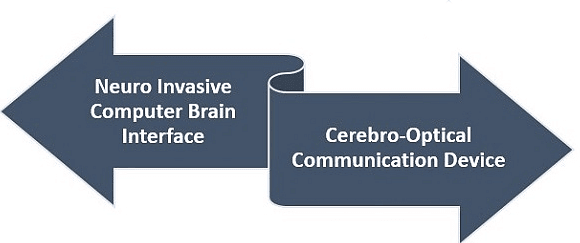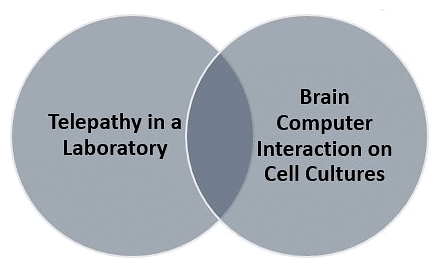Computer application in the Psychological laboratory and Psychological testing | Psychology for UPSC Optional (Notes) PDF Download
Introduction
Synapses, the neural connections in the brain, are often likened to the switches found in computers. However, computers lack inherent qualities of the mind such as self-direction, intuition, innovation, imagination, metaphor, creativity, adaptability, versatility, emotion, irrationality, inconsistency, subjectivity, consciousness, and other similar traits, unless they are programmed to mimic them. Computers are limited to performing tasks for which they have been specifically designed. While it is possible to artificially simulate memory, language, vision, and other similar abilities on a computer.
Explaining Brain-Computer Interface in Psychological
An interface that facilitates direct communication between the human brain and an external machine is referred to as a brain-computer interface (BCI), direct neural interface, or brain-machine interface. These interfaces aim to enhance various aspects of human cognition or sensorimotor abilities. Many researchers have utilized software based on dynamic neural networks to replicate the neural foundation of memory. "Synaptic runways" refers to the abnormal and exponential growth of synaptic connections, which can explain the interference of old memories with the storage of new ones in neural network models. Proactive computers have the ability to imitate symptoms related to psychosis and mania, including delusions, epilepsy, numbness and tingling syndrome, cortical map reorganization after a stroke, differentiation between systemic and functional harm in multi-infarct Alzheimer's disease, movement disorders in Parkinson's disease and Huntington's disease, and the functional aspects of the frontal lobe related to affect, memory, and behavior, among other phenomena.
Integrating Computers into Evaluations and Probes
Computers have the potential to assist in clinical practice by aiding in tasks such as diagnosis, assessing symptom severity, and evaluating treatment effectiveness. Computerized questionnaires, such as the Hamilton Rating Scale for Depression, the Yale-Brown Obsessive Compulsive Scale (YBOCS), the Hamilton Anxiety Scale, and the Leibowitz Social Anxiety Scale, can be used to obtain clinical ratings. Additionally, computers are utilized in diverse investigative settings, including computed tomography, magnetic resonance imaging, positron emission tomography, electroencephalography, electrochemical impedance spectroscopy, chromatography, and experimental laboratories.

Neuro-Invasive Computer-Brain Interface
Invasive studies on brain-computer interfaces (BCIs) have primarily focused on restoring impaired vision and providing new abilities to individuals with paralysis. In these studies, invasive BCIs are surgically implanted into the grey matter of the brain. While invasive devices offer the strongest signals among all BCIs, they are susceptible to the formation of scar tissue, which can potentially weaken or disrupt the signal. The brain is the organ responsible for cognitive processes and reasoning.
To facilitate interaction with the world and control external equipment, paralyzed individuals can utilize a Cerebro-optical Communication device. This device establishes a direct connection between the brain and computer applications, allowing individuals to communicate and operate external equipment. The Brain Communication BCI device, developed by Neural Signals, employs glass spheres equipped with microelectrodes that are coated with proteins promoting binding to neurons.
Semi-Invasive Brain-Computer Interface
BCI devices that are partially invasive are positioned inside the skull but outside the grey matter of the brain. These devices carry a lower risk of causing scarring in the brain compared to fully invasive BCIs. Moreover, they generate signals with higher resolution than non-invasive BCIs.

Telepathy in a laboratory
Research on brain impulses is advancing with the aim of developing synthetic or computer-mediated telepathy. The primary objective of this research is to investigate whether there are universal patterns in the brain's electrical activity that occur just prior to verbal expression, as observed through EEG measurements. Since 2009, researchers have predominantly focused on the potential applications of their discoveries in governmental contexts.
Brain-computer interaction based on cell cultures
Researchers have created devices that enable communication with brain cells and the construction of artificial neural networks in cultures that exist outside of mammalian organisms. By utilizing cultured brain tissue, scientists have conducted experiments to develop problem-solving networks, build rudimentary computers, and control robotic devices. These advancements have significantly contributed to the progress of research in the field of implantable devices for animals.
Computers in Psychological Assessment
Computer software has been developed to provide psychotherapy to patients with minimal human intervention. This includes cognitive therapy for depression, anxiety-based therapy for phobias, interventions to restore self-esteem, self-analysis for addressing cognitive deficiencies, and cognitive retraining for individuals with brain injuries. In these areas, computers can act as supplements or potential replacements for human therapists. Through a dialogue mode, users can engage in natural conversations with the software.
In addition to psychotherapy, computers find applications in Regulatory Psychology in the following ways:
- Maintaining comprehensive and well-designed databases to track relevant information.
- Generating reports, certificates, and other documents for consultation purposes.
- Enabling online tracking of drug utilization and other patterns of interest.
- Facilitating statistical applications for data analysis in the field of regulatory psychology.
Computerized Testing: Advantages of Computer Adaptive Testing (CAT)
CAT has emerged as a fundamental testing process, particularly in certification and licensing examinations. This method increases productivity while offering benefits such as individualized testing, efficient item selection, and adaptive scoring based on an individual's performance.
Psychometric Approach in Computerized Testing
A solid psychometric theory serves as the foundation for computerized testing. Understanding general testing theory and psychometric reasoning is crucial for effective implementation of CAT and other computerized assessment tools.
Remote Neuropsychological Assessment
With the growth of telecommunications and the internet, computer-based neuropsychological testing can now be conducted remotely. This remote neuropsychological assessment allows for efficient evaluation and practice, with cognitive linguistics and statistical psychology contributing to its development.
Advanced Telecommunications Research
Researchers in Kyoto, Japan, have made remarkable progress in the field of computational physics laboratories. They can recreate images from the brain and visualize them on a computer screen, highlighting the potential for innovative applications in neuroscience and psychology.
Conclusion
Computers have become indispensable tools in psychological labs and testing. As technology continues to advance, there is a need for further research and improvement in software quality, assessment.
|
165 videos|205 docs
|






















